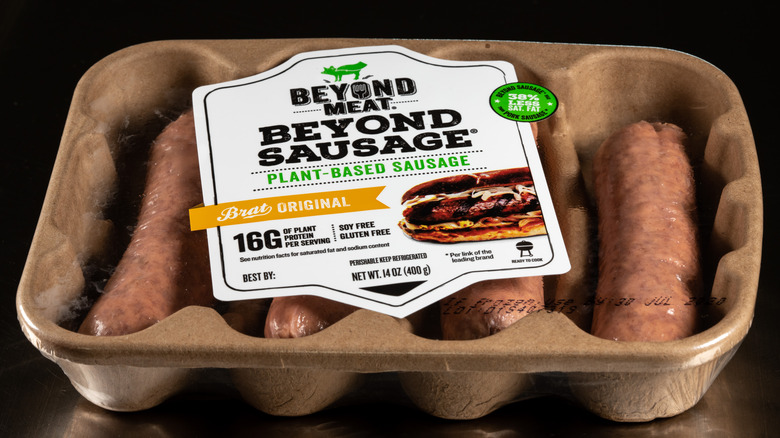The Truth About What's Really In Hot Dogs
Why is it that the thing that tastes so good is oftentimes the very thing that is not good for you? Hot dogs, sadly, tend to fall into this category. However, knowing the truth about what you are consuming can help you decide how often to indulge in your favorite backyard barbeque or ballpark treat. If you've ever looked at the ingredients of popular hot dog brands, chances are you've seen multi-syllabic words and mysterious phrases. Eat This, Not That! did some digging into what these ingredients are — and what they could be doing to your body.
One ingredient on some name-brand hot dog labels is mechanically separated chicken, a "paste-like and batter-like poultry product" common in processed foods (via US Department of Agriculture USDA). Eat This, Not That! describes mechanically separated chicken as "the gristly pieces of meat left clinging to carcasses after the recognizable cuts had been removed." Health experts also caution that seeing "beef" and "natural" on the label does not mean the hot dog is healthy. These can be red flags for hormones and toxic chemicals. As far as additives, sodium diacetate is a common ingredient in hot dogs that protects you from the meat's potentially harmful pathogens. And sodium nitrate is a preservative that has long been known to be unhealthy. "The World Health Organization (WHO) has declared Sodium nitrate as a 'probable' carcinogen," certified health and wellness coach and integrative nutritionist Molly Hoffman tells Eat This, Not That! Other potentially harmful chemicals in hot dogs can include sodium phosphate, which can lead to osteoporosis, and hydrolyzed corn protein, which can cause a whole range of potential health issues, according to Hoffman.
Which hot dogs are the safest to eat?
While there are a lot of reasons to avoid hot dogs, there are thankfully some healthier and tasty alternatives available to satisfy your craving. One brand worth considering is Applegate Organics 100% Grass-Fed Beef Hot Dogs. "I like this product because it is organic and made with high-quality grass-fed beef," Mascha Davis, registered dietitian and author of Eat Your Vitamins tells Mind Body Green. Women's health dietitian Valerie Agyeman tells Mind Body Green she also recommends Teton Waters Ranch 100% Grass-Fed Beef Hot Dogs because they are "free of fillers, nitrates, nitrites, and added sugars," adding that they are also "super juicy."
If you're a vegetarian, there are several plant-based hot dog options for you, such as Beyond Meat's Original Plant-Based Sausage, Field Roast's Plant-Based Bratwurst, and Yves Mediterranean Harissa Veggie Sausages. Some of these even provide some vitamins and minerals. For a lower sodium option, consider trying Yves Tofu Dog, which only contains 9% daily value of sodium, or other tofu-based hot dog options.
So, before going for the more traditional hot dog, consider trying a healthier version with a squirt of low-sodium mustard and some crunchy fresh toppings such as sliced jalapenos, onions, or even pineapple or mango for a nutritious hot dog that knocks it out of the park (via SF Gate).


